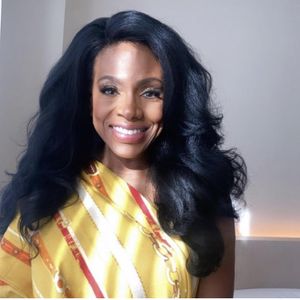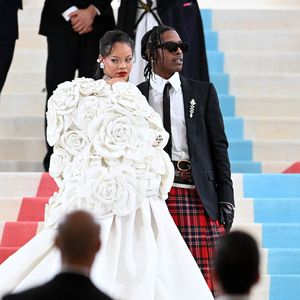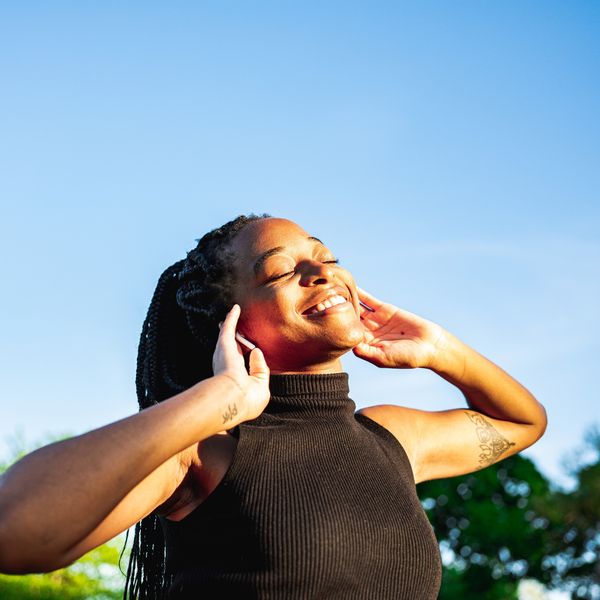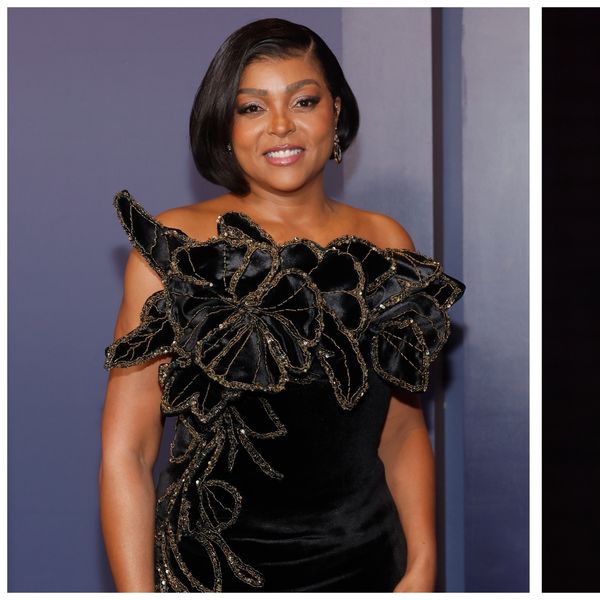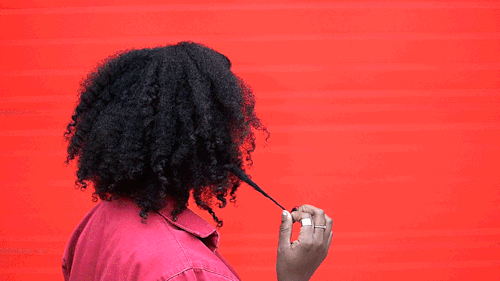
Why The Word "Beautiful" Makes Me Uncomfortable
Just like so many other little girls, I recall wanting to be just like my mom as a child.
She was the coolest woman. The proof of that could be found in her taste, particularly her jam back then which was none other than "Back That Ass Up" by Juvenile. (Although she might plead the fifth if asked about this now.) Most of all, my mom was and still is the baddest. Not in the most modern, lackluster definition of "bad"—I'm talking throwback Webbie and Boosie Bad: "I-N-D-E-P-E-N-D-E-N-T" type bad, with the looks to match, of course—before it was a hashtag.
Just ask the many of men I ran off in Target parking lots and high school boys who I've given the "Helga Patacki" treatment to limit their seuxal innuendos. Beyond having to defend her honor against peers, following in her vanity felt like a failed aspiration for me much of the time—something that I could never live up to, even as I grow to look more like her everyday.
Nevermind that for many years in my childhood, kids taunted me for closely resembling my father (picture Ice Cube circa 1995), a handsome man, but a bit hard for a 12-year-old girl. I realize now that my issues were bigger than that -- my issues are me and my inherent socialization.
I realize now that it's not simply resembling her that I wish to do, it's about having the features that separate us amongst our culture. You see, what I haven't mentioned is that I'm brown with a short, unkempt head of hair, while my mother is mixed race and fair-skinned with long, curly hair.
Through this comparison, I've come to notice the hatred I carry for my hair and how I view my vanity through it.
This revelation is fairly new for me, as it hadn't hit me until I realized how unnerving I often become when men refer to me as "sexy," "beautiful," or "gorgeous" — anything beyond "cute" feels like an oversell in my mind. I could never quite articulate, even within the confines of my own mind, why I felt unworthy and uncomfortable with such compliments from some but not others. After all, this was what I wanted...the beauty of my mother, and the catcalls were the nature of that particular beast.
Sadly, I have to admit that the compliment feels far more meaningful to my spirit when it comes from women and women who exude my mother's qualities. Some might argue that women possess more important qualities than beauty and, as this is true, I won't try to dispute that fact. However, that is currently not my truth. Without hesitation, I will tell you that vanity is of high importance to me, amongst those other qualities that are of importance, which I think is fine. The true problem lies in the terms that I've come to define my beauty on.
Much to my dismay, after so many years of denial and disillusion, I've realized that I have been programed by Eurocentric standards and the desire for some of the qualifying features reflecting those set of standards.
It didn't look like the hatred that I've seen so many others emit, so that left me to believe that hate was not present. I've never made ignorant comments about wanting to procreate with lighter people so that my child wouldn't have certain features, or loving them any differently should they not meet these standards. I don't find my features unattractive on anyone else who may share them, and I have always been so in love with the way that the diversity and range of blackness could be viewed in my brown skin.
But for every part of me that loves my complexion, I hate the hair I was given to complement it and I hadn't realized how much of an impact it had on my self-esteem until I was forced to write it out.
Now, more than ever, I'm questioning so much of my being and the worldviews that I possess in regards to what many would deem as a self-hating quality. I question whether my sexual attraction to certain women is a "type" or a fetishism? Furthermore, I'm able to reflect on why I feel so disarmed by a 12-year-old (my little sister and my mother's doppelganger) and her disdain toward my natural hair and approval towards my straight weaves. I'm left with no room for the perfect teaching moment these scenarios might serve as.
My views towards my hair have long-affected my self-esteem (subconsciously and consciously) and just as this is not a battle that began overnight, it is not one that I anticipate will be resolved overnight.
This is the undoing and the esteem of someone who had received perms from first grade up until the natural hair movement gained momentum during my Junior year of college.
Someone who sang the words to India Arie's "I Am Not My Hair" but didn't really believe in them.
Someone who loves what the natural hair movement means for every other woman except herself.
Someone who has never truly been taught to love and value her hair in the face of the clear genetic differences, mostly because that type of woke parenting wasn't a thing yet. Not to mention, our views on hair and the growing insecurity due to colorism wasn't a primary cause back then. With a growing awareness of these issues in communities of color, it seems that we make greater strides to remind children that in spite of differences, we're all beautiful.
With time, I hope to work through and change my worldview -- especially for the child I hope to bring into the world someday. Whether that child be a boy or girl, teaching them to love the nuances of blackness is an indispensible lesson that will stick with them throughout their life.
Instead of feeling insecure in the word "beautiful," I want them to feel uncomfortable with it simply because they have far more to offer this world than good looks and pretty hair.
I won't sit here and pretend I've done the hard work and that everything from here on out will be easy because it won't -- change never is, and especially not change that requires a certain level of attention and unpacking to undo the hate that's been passed down generationally since our people arrived in chains.
Well aware that change begins within, I'm fully prepared to take on the hard work for myself with high hopes for the gradual disintegration of the colorism and self-hate we give within our culture.
Otherwise, the cycle of failure will live on, as I can never be someone I'm not.
Motor City native, Atlanta living. Sagittarius. Writer. Sexpert. Into all things magical, mystical, and unknown. I'll try anything at least once but you knew that the moment I revealed that I was a Sag.
ItGirl 100 Honors Black Women Who Create Culture & Put On For Their Cities
As they say, create the change you want to see in this world, besties. That’s why xoNecole linked up with Hyundai for the inaugural ItGirl 100 List, a celebration of 100 Genzennial women who aren’t afraid to pull up their own seats to the table. Across regions and industries, these women embody the essence of discovering self-value through purpose, honey! They're fierce, they’re ultra-creative, and we know they make their cities proud.
VIEW THE FULL ITGIRL 100 LIST HERE.
Don’t forget to also check out the ItGirl Directory, featuring 50 Black-woman-owned marketing and branding agencies, photographers and videographers, publicists, and more.
THE ITGIRL MEMO

I. An ItGirl puts on for her city and masters her self-worth through purpose.
II. An ItGirl celebrates all the things that make her unique.
III. An ItGirl empowers others to become the best versions of themselves.
IV. An ItGirl leads by example, inspiring others through her actions and integrity.
V. An ItGirl paves the way for authenticity and diversity in all aspects of life.
VI. An ItGirl uses the power of her voice to advocate for positive change in the world.
Let’s make things inbox official! Sign up for the xoNecole newsletter for daily love, wellness, career, and exclusive content delivered straight to your inbox.
Tyler James Williams Explains Why His And Quinta Brunson 'Abbott Elementary' Characters Should Remain Friends
While Abbott Elementary fans are hoping that Janine and Gregory end up together, the show’s star has another take. Tyler James Williams plays Gregory on the Emmy award-winning sitcom, and he recently stopped by The Jennifer Hudson Show to share his point of view on his storyline with Janine, which Quinta Brunson plays.
“I hate to say it. I know that everybody’s always mad at me for this. I don’t necessarily want to see them together,” he revealed. “It’s partially an actor’s choice, but also somebody who, like, I read a lot of scripts all the time. I watch a lot of TV, a lot of film. I don’t think that we see displays of platonic love between two people often. I think it’s really easy to go right to they have feelings for each other, therefore they should be together. I like this dynamic of exploring withholding that and just actively loving each other where they are. That I like to see more.”
If you recall, they were co-workers who became friends but were secretly crushing on each other. They’ve had many awkward run-ins during and after school, like the unforgettable club scene where they were dancing nervously with each other in season one, and in season two, they finally kiss. However, it only made things even more awkward, and they decided to just be friends. Tyler further explained why he thinks it’s important to showcase that type of relationship on screen.
“I think it’s time for that. I think TV allows people to see things that could be their lives for the first time, and I think seeing a healthy friendship that is deeply caring about one another in a work atmosphere needs to be shown more than the relationship,” he concluded.
Abbott Elementary comes on every Wednesday at 9 p.m. EST on ABC.
Let’s make things inbox official! Sign up for the xoNecole newsletter for daily love, wellness, career, and exclusive content delivered straight to your inbox.
Feature image by Kevin Mazur/Getty Images

